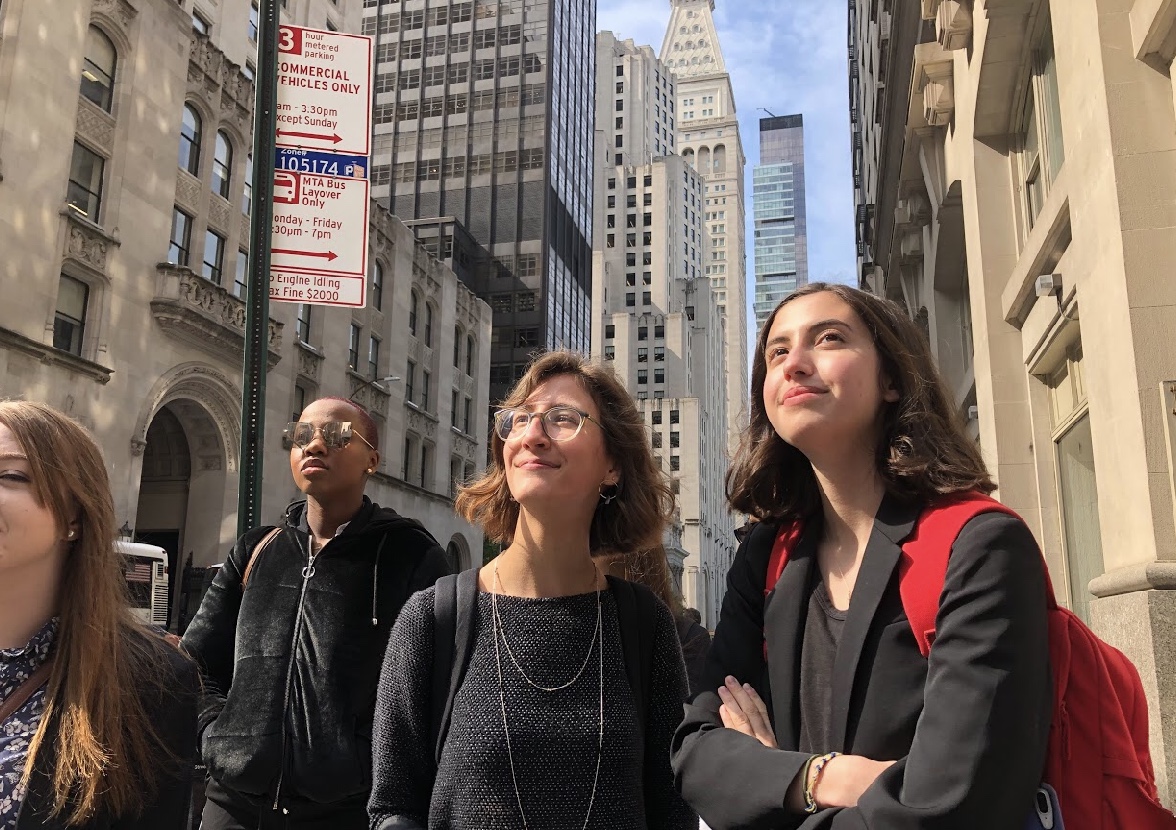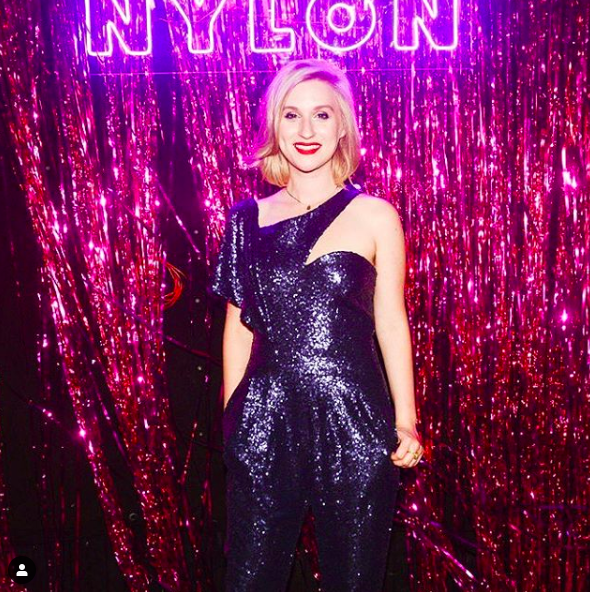All About Internships: Take The Lead’s Intern Interviews Gloria Feldt
Issue 100— July 8, 2019
Ask a college student in early spring what they’re most worried about, and I guarantee it won’t be their finals. It will be the dreaded internship search.
I am Anna Tropiano (pictured right), a Political Science and Writing student and an intern at Take The Lead this summer. As a rising junior at University of Michigan, I’ve witnessed firsthand how the process of landing the perfect summer internship before the last day of class can be a huge stressor for students. The stakes are high — employers today see internship experience as a critical differentiating factor in the hiring process, and internships are ranked at the top of desired learning experiences employers look for when hiring recent graduates.
So starting as early as January, students begin to feverishly send out their resumes and cover letters, desperate to find the perfect company and resume builder for the summer. And maybe, if they’re extremely lucky, one that’s paid. This week I interviewed Gloria Feldt, President of Take The Lead, about why internships are so important for career development, tips for interns, and how to connect with your dream company. Here’s what she had to say.
Anna Tropiano: Hi Gloria! My first question addresses why we’re discussing this topic. In your view, why are internships an important career step for women? And how do internships fit into Take The Lead’s goal of achieving gender parity by 2025?
Gloria Feldt: A big question. Internships are important because they give the intern a chance to test out different things, to try out different career aspects that we might not have a realistic point of view about. And this is true whether you’re a student like yourself, or maybe someone who’s thinking about making a life transition, or someone who’s reentering the workforce at a later age. You might think you want a certain career, but sometimes when you’re actually doing it you feel differently, or vice versa. Sometimes you discover a passion for something or skill set you didn’t realize you had.
So I think that internships are great for that reason. Internships are particularly important for women, and for young women, because men are more likely to be in leadership roles. Therefore, it’s less likely that women will have female mentors or sponsors. So for young women to have internships where they can get both mentors and sponsors, both male and female, is very important.
AT: Have you had any memorable experiences with interns?
GF: I was just thinking about how incredible some of my former interns are now. The first intern, Lauren Reeder, that I had when I began working on my own is now an elected judge in Houston, TX. She’s soared in her career. She was a student at NYU at the time, maybe in her junior year, and she just called me up. She had identified me as someone she wanted to get the experience with, and it was the right moment for me.
She was a fantastic intern — she organized my whole home office, which I could not have done without her. But more importantly, because of association, throughout her career, she’s been able to call upon me for letters of recommendation whenever she was trying to make the next move, such as when she applied to and got into Harvard Law School. I’m incredibly proud of her. She was in private law practice for a short while — everyone has their student debt to pay off — but she’s always been a public service minded person and last year she was elected judge.
Lauren Reeder on her experience with Gloria Feldt: “Working for Gloria was an incredible catalyst to my career in leadership. At age 21, I had wild aspirations and dreams, but being with her daily to watch leadership in action helped me frame my goals and visualize my success. After interning for Gloria I went on to attend Harvard Law School. I moved home to Texas to pursue my legal career for the last ten years. Since January, I’ve taken on a new leadership role as a State District Judge. I credit my time with Gloria for helping me shape my personal view of leadership and success.” Check out Lauren’s feature in The Houston Lawyer Magazine at https://www.thehoustonlawyer.com/
Dior Vargas has just written her first book and made an entire career working with mental heath issues of women of color. When she was my intern, I knew she was struggling with some personal issues. She was my intern right whenNo Excuses was coming out. So it was valuable for her to be learning the content I was writing about. And through her own struggles, she created her own path that’s now helping other people. And I hope that I had a little bit of influence on that. (Laughs.)
Dior Vargas, Latina Feminist Mental Health Activist, at a speaking engagement. Click here to follow her work.
I also just found out that another past intern, Gabrielle Korn, is now Editor and Chief of Nylon magazine, another, Maegan Vasquez, is a CNN White House reporter whose bylines I see regularly. The list goes on.
And all of these remarkable women, these examples are from a short time span — just the past 15 years.
Gabrielle Korn, Editor and Chief of Nylon magazine, from her Instagram. Follow her work here.
AT: Those are some inspiring stories. So what should female interns be focusing on to get the most out of their experiences? Any tips or Power Tools?
GF: Define Your Own Terms is the first Leadership Power Tool I think of. You’re there to learn and soak up everything. So be intentional. Think about, specifically, what you want to get out of this internship. You’re sometimes working for free, or else a fairly low wage, often doing entry level work — which is extremely needed by every organization. This is why interns are so valuable.
But, at the same time, you have an opportunity to think intentionally and proactively about what you want to get out of this internship. Even if it’s just one thing, one skill, one network. Think about it intentionally and know what you’d like to have happen, not that you’re just trying to get a summer job. Share that with the person or people you’re interning with. They’re often really open and helpful to providing you with what you’re looking for, whether it’s a particular skillset you want, or range of knowledge, or a person you want to meet. They won’t know, so tell them. And be sure that you have those conversations early on.
AT: Why should companies invest in interns?
GF: Companies know they need those interns to become employees later on. Again, it’s a two way street. You get a chance to work with a company, the company gets a chance to work with you. It’s always useful, and makes a great hiring tool because those hiring already know the person, know their strengths, and have built a relationship that can jumpstart employment later on.
For example, I have seen law firms do this. A friend and a mentor of mine was a partner in a large law firm in Phoenix, and I’d watch how he would have weekly lunches with the interns. I’m sure for those interns, just the opportunity to be in the room once a week and ask questions and get to knows leading constitutional lawyers in the country was a pretty amazing thing.
AT: I know a lot of college women (myself included) who stress over the internship search. Do you have any suggestions for finding the best internships, especially as college students with limited professional networks?
GF: Even if you personally don’t have contacts with the organization you want to work for, if you keep asking around, you’ll probably find a contact of some kind. It’s not just who you know, but who does your mother know, who does your friend’s father know. Use every network you have. Think expansively about where your connections are.
The second thing is — don’t stress, because it doesn’t help. (Laughs.) I mean seriously. Just believe whatever you end up doing will be useful, and then keep going until you find an internship that will be useful to you. You will get some applicable skills no matter where you are. It doesn’t have to be the company you want to spend the rest of your life with, and you will probably have more than one internship. Sometimes it’s just about building credibility — to give you a chance the next year to get the internship of your dreams.
(End of interview.)
Following in Gloria’s footsteps — in true intern style — here is my own personal “Sum” of 5 takeaways we’ve learned about internships this week:
Internships are important to young women because they provide access to mentorships and sponsors. At Take The Lead, I work for women willing and eager to answer my questions — and it’s made all the difference in changing how I view leadership.
When looking for internships, seek out role models at companies that you want to learn from. Before I participated in a week-long “Flash Internship,” with Oxford University Press this May, I researched what professionals we would be interacting with and then made sure to introduce myself and get the business cards of anyone connected to social science journals.
Use Power Tool #2, Define Your Own Terms, to be intentional about what you’re getting out of the internship. Then, communicate your goals to the people you’re working for. At our first meeting, Gloria pointedly asked me what I was hoping to get out of my internship at Take The Lead— and I said I wanted writing projects. Thank you to Gloria for giving me the nudge on this Power Tool.
Think expansively about your network and then use whatever you have. Unfortunately, children of parents without professional contacts are disadvantaged in this system. But regardless of who you are, or who your parents are, it never hurts to send that email to or call up someone you want to learn more about. “People generally love to talk about what they do,” my mother loves to remind me.
Don’t stress! Your internship doesn’t have to be with the company you want to spend the rest of life with. Internship experience is always important in building credibility. And from my point of view, don’t knock those regular summer jobs, either. I am learning much about communication and marketing from my part-time job at a bakery this summer. Like we say in tip #2, always be intentional about what you can learn.
Thank you to Gloria for this interview. As her intern, it’s certainly given me a lot to think about.
GLORIA FELDT is the Cofounder and President of Take The Lead, a motivational speaker and expert women’s leadership developer for companies that want to build gender balance, and a bestselling author of four books, most recently No Excuses: 9 Ways Women Can Change How We Think About Power. Former President of Planned Parenthood Federation of America, she teaches “Women, Power, and Leadership” at Arizona State University and is a frequent media commentator. Learn more at www.gloriafeldt.com and www.taketheleadwomen.com. Tweet @GloriaFeldt.




